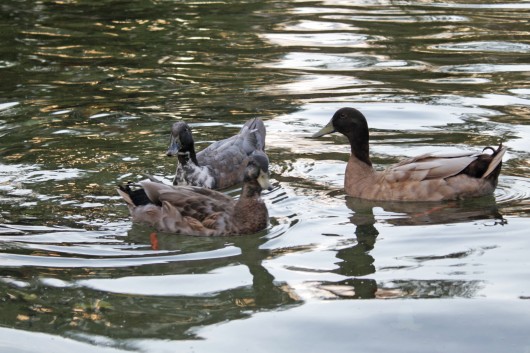After Mirror Lake was drained last November for a sustainability study, some Ohio State students were left wondering what would become of the beloved ducks of Mirror Lake.
Those ducks — which were initially relocated to a farm — will not be returning, a wildlife expert said.
That’s because most of the ducks, which were relocated using a specialized wildlife management firm hired by the university, were bred for food and genetically too heavy to fly elsewhere, said Dirk Shearer, president of the Wildlife Control Inc.
“Those were domestic ducks and offspring of domestic ducks that people had dumped there,” he said.
Shearer said that is how the Pekin ducks — also know as the common white farm duck — end up at ponds and lakes at parks around Ohio. The Wildlife Control Inc. was tasked with gathering and relocating the domestic ducks at Mirror Lake to a farm in Delaware County, because the ducks couldn’t relocate on their own. The owner of the farm asked to keep his farm off the record for fear that students might come searching for the ducks.
“If it had just been a bunch of wild ducks, they could have just drained the pond and the ducks would have flown over to the Olentangy River without a second thought,” Shearer said. “They can’t go find a new habitat — that’s why it was imperative that those ducks were actually relocated to a new home.”
Because they can’t fly very far, Shearer said that capturing and removing the ducks is as simple as setting up a large pin and herding the ducks out of the water and inside.
“It is simple, quick and humane,” he said. “The ducks were at their new home in no time.”
Shearer promises that all the ducks are doing well and have adapted to their new home, including the famed Afro Duck. This duck stood out among the other Mirror Lake ducks and was given that name because of its unusual head feathering, which many said looked like an afro.
“Head feathering like that comes about from crossbreeding a Pekin duck with a wild duck,” Shearer said. “You can see ducks like that occasionally at parks around here. That duck was more of a mutt than something fancy.”
Shearer said any ducks seen at Mirror Lake this fall will be wild ducks taking a rest stop during their migration south for the winter.
Still, any new ducks could have large flippers to fill, considering the previous Mirror Lake ducks drew students’ attention via popular social media accounts.
Those ducks inspired at least one Twitter account — @MirrorLakeDucks — and at least one Facebook page, which gave the ducks fictitious personalities.
Posts from @MirrorLakeDucks have continued despite the ducks’ absence. The account tweeted on June 6 “#bringbackMirrorLake so our baby ducklings can see what a real home is like.” A tweet was also sent mentioning Undergraduate Student Government President Celia Wright and former USG President Taylor Stepp on April 26 saying, “@celia_right @taylorstepp so like we will have a home next year?”
The @MirrorLakeDucks Twitter account had more than 3,260 followers as of Thursday evening.
Some students said they praised the ducks as staples of the university, and would like to see some of the old ducks back.
“I didn’t see the ducks as a nuisance at all. In fact, I used to go feed them my freshman year,” said Jacob Hammer, a third-year in psychology. “They were kind of an unofficial mascot for everyone.”
Despite some students’ love for the previous inhabitants of Mirror Lake, the university has no plans to replace them, Administration and Planning spokesman Dan Hedman said, because it’s not a practice of the university to place wildlife at the lake.
Still, Hammer said the university should make some effort to get the ducks back.
“They made us as a student body happy. Someone did us a favor by introducing the ducks,” he said.



